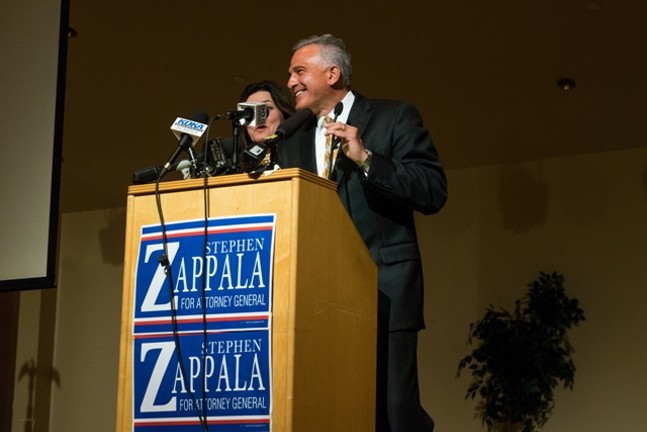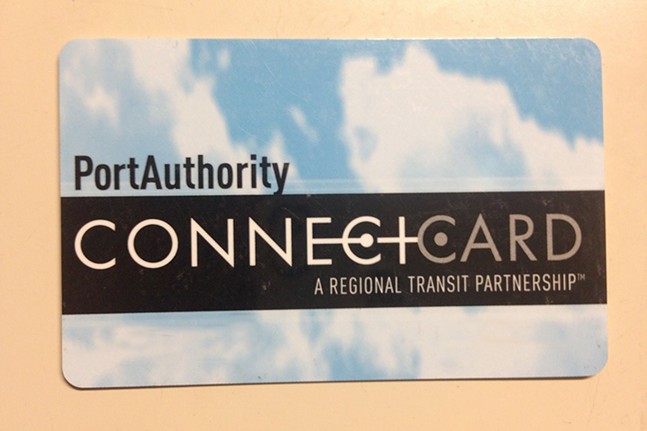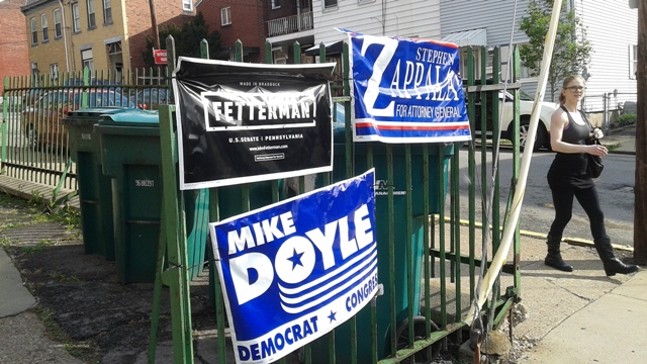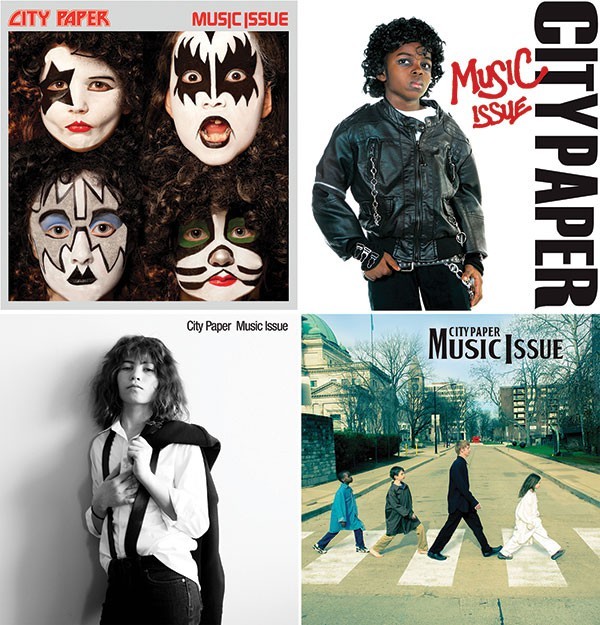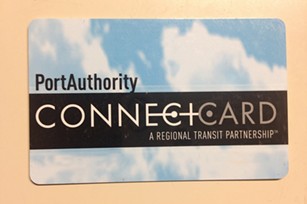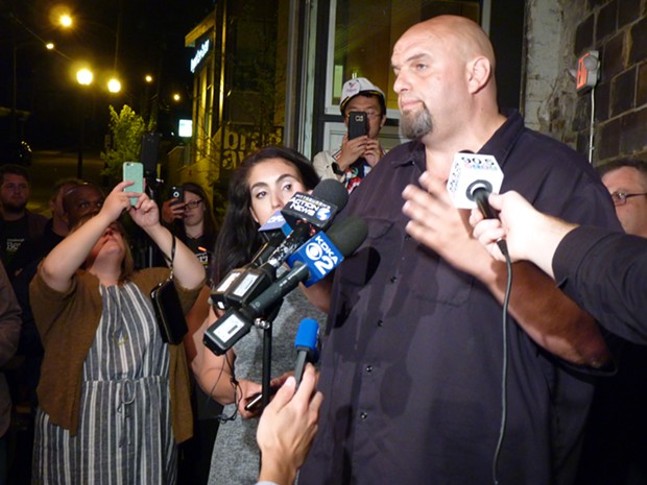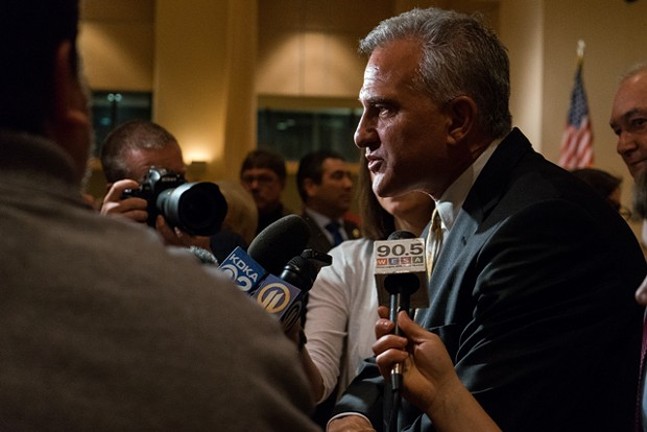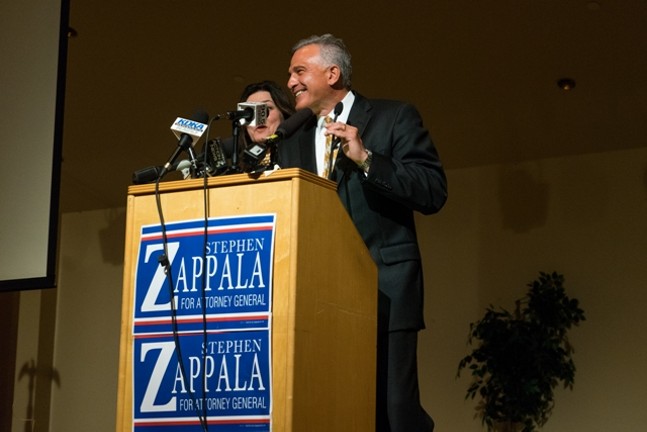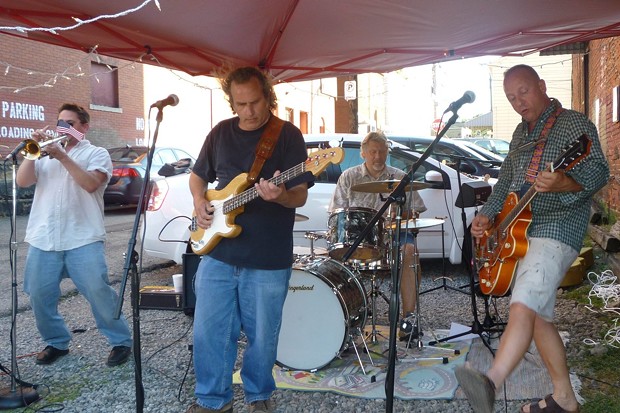Friday, April 29, 2016
If you live under a rock, maybe you've kept yourself away from this in-your-face political season. The Pennsylvania primary was last Tuesday, and leading up to it, the presidential candidates made their last pleas to Western Pennsylvanians.
Over the weekend, Republican presidential candidate Ted Cruz stopped by Gateway High School in Monroeville to remind everyone that does not believe in "little girls" being in bathrooms with "grown men."
On Monday, the day before the primary, Democratic presidential candidate Bernie Sanders gave young people a talkin' to at the University of Pittsburgh's Fitzgerald Field House about political participation and why college debt in the U.S. is unfair.
On primary day, Braddock Mayor and U.S. Senate candidate John Fetterman spoke to media outside of his Braddock polling place, saying he was disappointed by the millions the Democratic party poured into fellow U.S. Senate candidate Katie McGinty's campaign. "You would expect that from the Republicans to pour [money] into a race but not your own party."
By now, we all know what went down in Pa.'s primary (although if you want to re-live what happened throughout the day, check out our live Pa. primary blog), but editor Charlie Deitch has this postmortem on why votes went the way they did on Tuesday. (Spoiler alert if you've been living under that rock: Clinton and Trump won Pa.; Zappala lost the Pa. Attorney General Dem nod to Shapiro; and McGinty won the U.S. Senate Democratic primary, but Fetterman did much better than expected.)
—————————-
This week, the Affordable Housing Task Force delivered its recommendations to Pittsburgh City Council, which include creating an affordable housing trust fund of $10 million and utilizing incentive-based inclusionary zoning.
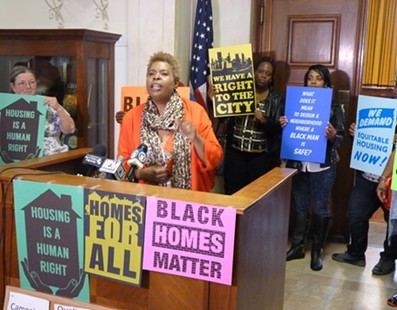
CP's Rebecca Nuttall covered the hearing where City Council received an update on the work of the task force, which has met more than 30 times since it was created last year. "One of the things that is critical to any kind of affordable-housing effort in the city is a dedicated source of funds to pay for it," said task force co-chair Raymond Gastil, on the suggestion to develop a trust fund. In addition to the trust fund and incentive-based inclusionary zoning, the task force also recommended expanding utilization of the Low Income Housing Tax Credit.
—————————-
The Port Authority Board of Allegheny County voted unanimously this week to pass new fare changes that will take place in 2017. New changes would incentivize use of the ConnectCard and rid the system of higher fares for areas farther away from Downtown, among other changes. Read more about the changes here.
—————————-
Despite heated political battles, life goes on in the arts and nightlife realms.
The iconic Lava Lounge on Pittsburgh's South Side is marking its final weekend, with events this Friday and Saturday. Owners Steve Zumoff and Scott Kramer, who opened the Lava Lounge in 1996, plan to reopen it in May as Monster, an LGBTQ-friendly bar.
This weekend marks the final performances of Quantum Theatre's production of Master Builder. The production takes place on the ninth floor of Building Two of Nova Place on the North Side (formerly Allegheny Center), offering interesting views of the city, which arts editor Bill O'Driscoll writes is "alone is worth half the price of admission." Read CP contributor Stuart Sheppard's review here.
—————————-
On our podcast:
This week on the City Paper podcast, our panel, featuring editor Charlie Deitch, multimedia editor Ashley Murray and staff writer Ryan Deto, breakdown what happened on primary day in Pennsylvania. The conversation gets a little crazy, but Charlie keeps order with a gavel he brought to the studio. (Really, it was a gift from when he was a courts reporter back in the day.)
—————————-
On our music blog:
Each week on our FFW music blog, we make a Spotify playlist containing tracks from artists mentioned in the current music section. Listen below!
—————————-
From the pages of our print edition:
This week, freelance contributor Melinda Nanovsky writes about a technique called “tactile target-training" — a major advancement used at zoos around the country — that was developed at the Pittsburgh Zoo & Aquarium. The technique allows scientists and aquarists to give individualized and efficient care to each creature in the aquarium.
—————————-
This week in City Paper history:
This week last year, we recreated four iconic album covers starring local kids for our 2015 music issue. The photo shoots were hilarious and endearing, and we documented the making of each cover in our behind-the-scenes video. Two covers were initially approved. However, after the four possible cover shots came in from photographers Sarah Wilson, John Colombo, Renee Rosensteel and Heather Mull, art director Lisa Cunningham made a last-minute push, just a few days before the paper was printed, to include all of them. While it was a bit of a logistical nightmare for our circulation manager and drivers, the end result was one for the ages. Read here for more stories from this week in City Paper history.
Editor's note: This post was updated at 2:27 p.m.
Tags: Pittsburgh , City Paper , Weekly Roundup , Pa. primary , John Fetterman , Hillary Clinton , Donald Trump , Stephen Zappala , Josh Shapiro , Katie McGinty , Pittsburgh Zoo , tactile training , Lava Lounge , Affordable Housing Task Force , Image , Video
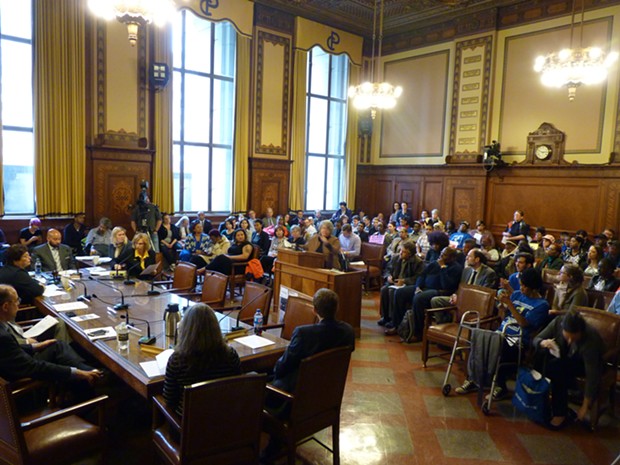
"One of the thing's that is critical to any kind of affordable housing effort in the city is a dedicated source of funds to pay for it," said task force co-chair Raymond Gastil. "It's great to talk about things, but there's a severe shortage of somewhere between 19- and 21-thousand units. You need money to address that."
On Thursday Pittsburgh City Council received an update on the work of the task force at a special meeting in Council Chambers. The group has met more than 30 times since it was created last year.
In addition to establishing a $10 million Housing Trust Fund through the Urban Redevelopment Authority of Pittsburgh, the task force is recommending programs to support existing affordable housing in the city. The task force is also recommending programs to monitor affordable housing that is set to return to market in an effort to preserve the affordability of the units.
Another recommendation calls for incentive-based inclusionary housing requirements for all developments of 25 units or more receiving public subsidies. This would include housing for households at 50 percent area median income for rental units, and 80 percent AMI for home ownership.
A final recommendation would seek to expand utilization of the Low Income Housing Tax Credit at the four percent level, which could support new affordable housing construction, as well as rehabilitation of existing housing.
"I look forward to taking the task force recommendations and seeing how we can change it from recommendations to action," said Councilor Ricky Burgess, District 9. "At the end of the day we're going to have to provide new housing whether it's new buildings or rehabbed buildings."
Members of council were overwhelmingly supportive of the recommendations. However, Council President Bruce Kraus expressed frustration with the process of securing federal funds that could be used to rehab existing affordable units.
And Councilor Darlene Harris, District 1, raised concerns about using incentives like zoning changes to entice affordable housing developments because any change could interfere with the homes of residents already living in the area.
Tags: affordable housing , Pittsburgh , city council , low income tax credit , rehabillitation , Keeping Up With the Council , Image

This means if a developer receives public subsidy or city assistance like a zoning variance, only then would they be required to provide a percentage of affordable housing. However, the city has yet to specify what public subsidies or city assistance would require developers to include affordable units nor have they specified what percentages would be required.
This vagueness has caused some advocates to fear not enough will be done to fix the city’s affordable housing issues.
Helen Gerhardt of Homes For All PGH, a coalition of advocacy groups focused on affordable housing, said she commends the task force on specifying the $10 million a year goal and using Community Land trusts as a model. However, she added that all new developments should be mandated to include affordable housing, not just projects that need city assistance. She says that only 17 percent of inclusionary zoning policies in the country are incentive-based.
“We currently face a deficit of 21,000 [affordable] units. This is a housing crisis,” said Gerhardt.
Paul O’Hanlon, a housing and disability-rights lawyer, also commended the task force and Mayor Bill Peduto, but said this should have happened years ago. He also agreed that inclusionary zoning should be mandatory and not incentive-based.
“Incentives tend to not benefit poor people. They tend to benefit developers,” said O’Hanlon.
He also believes that requiring only developments of 25 or more units to include affordable units was too weak a policy. “If five units are going up with subsidies, why shouldn’t one be affordable?” O’Hanlon was also concerned that the recommendations only mention providing housing for residents making at or below 50 percent area median income, when he said that the real need is at or below 30 percent area median income.
Ronell Guy, executive director of the Northside Coalition for Fair Housing, spoke passionately to the crowd and questioned what work the task force had actually accomplished. “They did not come up with one new suggestion. We knew to do this 20 years ago,” Guy said. “There is no reason to continue to study. Just get it done.”
To Guy’s point, it appears many of the task force suggestions have already been accomplished on a smaller scale throughout the city. Peduto has already created a housing trust fund for East Liberty; nonprofit developer Lawrenceville Corporation started its own Community Land Trust in January, and incentive-based inclusionary zoning was forged through the Penn Plaza agreement concerning the Mellon Orchard development. (The owners were granted a zoning change, and the city received requirements for 20 percent affordability at the future development).
The Affordable Housing Task Force finalized proposals are due May 27. The next meeting date has not been set.
Tags: affordable housing , community land trust , Pittsburgh City Council , inclusionary zoning , Image
Thursday, April 28, 2016
Updated: Port Authority of Allegheny County board unanimously approved the new fare changes. PAT CEO Ellen McLean says the fare change "simplifies an overly complex fare system."
However, one Mt. Lebanon resident felt the policy change included a "hidden fare." Glenn Walsh said the fare change includes a clause that eliminates the free continuing transfer given to Monongahela and Duquesne incline riders. Currently, incline riders who wish to transfer to a bus or T line, can do so for free by requesting a paper continuing transfer slip after paying their $2.50 incline fare. But since PAT is eliminating all paper transfers, they are also eliminating the free continuing transfers for incline riders. (If they wish to transfer to the bus or T, incline riders will have to pay a $1 fee.)
"For years Port Authority has understood that fares on Mt. Washington should be the same," said Walsh. "Why now discourage incline ridership?"
Molly Nichols of transit advocacy group Pittsburghers for Public Transit agrees that PAT should not be eliminating the free continuous transfer and goes even further on the transfer-related proposals.
"All transfers should be free," says Nichols "It's not cool to be taking the last free transfer away."
During the board meeting, PAT board chair Bob Hurley commended the PAT staff for managing a long a thorough public process. PAT has held two public hearings and read through 1,500 suggestions submitted by the public via mail and online in the last few months since announcing their intentions to change the fare system.
__
The history of fare changes at the Port Authority of Allegheny County have been pretty predictable throughout the authority’s history. Since 1975, there have been 12 fare increases, jumping from 40 cents in 1975 to the last fare increase to $2.50 in 2012.
But starting in 2017, the PAT is proposing instituting changes which will lower fares for some riders, after the eliminating the surcharge for zone 2. All fares will cost $2.50 when using a ConnectCard, the authority’s electronic-fare system (or $2.75 for cash fares). According to statistics from PAT, a fourth of its customers will save $1.75 per ride.
“A lot of our poorer communities are far out on our system,” said PAT board chair Bob Hurley at a recent PAT board-committee meeting. “This brings a great deal of equity to our system.”
City Paper wrote about the proposed fare changes in January. Since then, PAT has held two public hearings and read through 1,500 suggestions submitted by the public via mail and online. The changes, most of which will take effect January 2017, are outlined here:
- $2.50 fare throughout whole system if using ConnectCard
- $2.75 cash fare
- $1 transfers using the ConnectCard only (cash users will have to pay $2.75 again if transferring)
- $1 fee to purchase new ConnectCards
- Pay-as-you-enter on all routes
- Exit through the back door(s) on all routes. (Riders unable to use the back door can exit through the front.)
- Elimination of the Downtown free zone for bus rides. (Light-rail will still be free Downtown and to the North Shore.)
- Half-fare passes for people with disabilities will be available on ConnectCards, as will reduced-fare child passes eventually
- $7-day pass available for purchase
- Suburban light-rail riders will operate on a honor system and will tap cards either in the car or on receptacles on stations, starting July 2017
At a Planning and Stakeholder Relations Committee meeting last week, the board supported the proposed changes to the fare system. The full PAT board will vote on changes Fri., April 29, at the Port Authority offices Downtown.
Port Authority spokesperson Jim Ritchie says the authority plans to conduct a wide-ranging public information campaign on the fare changes, if the board approves.
To attend the meeting: 9:30 a.m. Fri., April 29. Port Authority Board Room, 345 Sixth Ave. (fifth floor), Downtown
Tags: Port Authority , Allegheny County , ConnectCard , Image
But fans of the urban landscape will be especially thrilled by the venue Quantum has arranged for this Ibsen classic: The view from the ninth floor of Building Two of Nova Place (formerly Allegheny Center) alone is worth half the price of admission.
The former office space in the recently sold complex has been stripped bare, meaning a short walk around the perimeter gets you a 360-degree low-flying-bird’s-eye view of Pittsburgh that’s centered a few blocks behind PNC Park. Arrive early for a daylight perspective. My favorite vantage lets you gaze across Deutschtown and up the Allegheny valley all the way to UPMC Children’s Hospital on the Lawrenceville hillside, and beyond.
The play, meanwhile, is staged before the windows that look out on the Downtown skyline, and the wraparound windows take full advantage of the dusk that descends throughout the first of three acts (for performances starting at 8 p.m., which most of them do).
Dusk descending is also an apt metaphor vis-à-vis Ibsen’s script, which grapples with mortality, the notion of legacy and the fear of obsolescence that grips Halvard Solness, an aging architect with a wandering eye.
The play is knotty, as Ibsen tends to be; after the show, I had a fruitful discussion with a fellow attendee about whether the whole story had taken place in Solness’ head, the other characters merely manifestations of his own psyche. But Master Builder will definitely get you thinking; indeed, a week after seeing it, I feel like I’m still processing.
For another take, here’s Stuart Sheppard’s review for CP.
The Master Builder has four more performances through Sunday.
Tickets are $38 and are available here.
Tags: The Master Builder , Quantum Theatre , Nova Place , North Side , Image
Wednesday, April 27, 2016
Tags: Frankie Cosmos , Freddie Gibbs , True Widow , The Thermals , FFW>>
But this was different. Sestak, an uber-liberal, was playing well with the party's liberal base despite his run-ins with the Democratic Party. The party asked everyone and his brother to run for the seat before McGinty agreed. And she didn't just get the party's support in spirit. It dumped millions of dollars into advertising in the campaign's final week, and money carried the day. CNN's Manu Raju wrote an excellent piece this morning on how the party overlords managed to get their way in Pennsylvania. So money made a difference, but based on the numbers, I don't think it was the only factor.
McGinty and Sestak are both from the Philadelphia area and they dueled out east for those votes. That made Western Pennsylvania the real battleground: Enter the Fetterman Factor. Braddock Mayor John Fetterman may have finished a distant third, but the final results tell only part of the story. McGinty certainly had a lot of support out this way by virtue of being the party's choice. But Sestak has never been without his supporters. The difference this year is that Sestak and Fetterman are very similar candidates. They are very liberal candidates and care deeply about a lot of the same issues. Both favored a ban on fracking, for example.
But while Fetterman may not be known statewide, he's a bit of a political celebrity in Southwest Pa. Fetterman overwhelmingly won Allegheny county with 45 percent of the vote. Sestak came in third with 19 percent. Elsewhere across the region, Fetterman soundly beat Sestak, coming in second in places like Beaver, Butler, Westmoreland, Armstrong and Fayette counties. In fact, Sestak's numbers were sadly pedestrian in these areas. And while you never know how someone might have voted if their favored candidate wasn't in the race, I think it's fair to say that Sestak would have benefited greatly from a Fetterman-less primary. Fetterman's problem a steep drop-off as you moved farther east. By the time he hit Bedford County, his numbers were in the basement, and got steadily worse from there. Still, this race did give him more statewide notoriety, even as it showed how popular he is regionally.
Patty Kusick, a 73-year-old Mount Washington voter, says she supported Fetterman and won't be surprised if she gets the chance to do it again.
“He is so intelligent and his view is so far-reaching that it is maybe out of the grasp of regular voters," Kusick says. "I think he is challenging the dynamics [of the party], and hopefully his tenets will become the tenets of the Democrats in years to come.”
"We came up short, but we created a movement," Fetterman told reporters. Well, we do vote for county executive again in four years!
This was another case of simple geography (well, and campaign chicanery if you believe the rumors, but more on that in a second).
Montgomery County Commissioner Josh Shapiro defeated Allegheny County District Attorney Stephen Zappala and Northampton District Attorney John Morganelli. Both Morganelli and Zappala ran on the idea that the state needs a prosecutor, not a politician. Shapiro is an attorney was never a prosecutor. In the end, Shapiro came out on top, with 47 percent to Zappala's 36 percent. Morganelli got 16 percent.
Based on Zappala's numbers in Western Pennsylvania, it looked like this thing was going to be a bloodbath. He won Allegheny County with 73 percent of the vote. In fact he took more than 70 percent of the vote in counties across the region, including Beaver, Westmoreland, Washington and Butler. But the numbers started to drop as you left the region. Shapiro won several northwestern counties, and as the race swept east, both he and Morganelli picked up steam. In several central and eastern counties, Zappala not only lost to Shapiro, he lost to Morganelli as well.
Throughout this race, there was a lot of speculation that Morganelli might have just been running to siphon the "prosecutor-not-a-politican vote" from Zappala. Of course, no one will ever know for sure but whether intentional or accidental, it worked like a charm.
Ryan Deto, Ashley Murray and Rebecca Nuttall contributed to this report.
Tags: Pennsylvania , primary , Joe Sestak , John Fetterman , Katie McGinty , Senate , Pat Toomey , attorney general , Stephen Zappala , Josh Shapiro , John Morganelli , PolitiCrap , Image
Montgomery County Commissioner Josh Shapiro has won the Democratic nomination for Pennsylvania Attorney General. He faced Allegheny County District Attorney Stephen Zappala and Northampton District Attorney John Morganelli in yesterday's April primary election.
Editor Charlie Deitch has a breakdown of the numbers here.
“I’m honored to have earned the support of voters from every corner of our Commonwealth and to be the Democratic nominee for Attorney General," Shapiro said in a statement last night. "Throughout this campaign, I’ve pledged to reform our system, take on the status quo and fight for our values. Too many people today feel the deck is stacked against them and they can’t get a fair shake. Pennsylvanians want an Attorney General who will restore fairness, clean up a mess and do more to protect the safety, the health and the rights of everyone in our Commonwealth. That’s the kind of Attorney General I’ll be. I promise today that I will lead with integrity and stand up to the powerful interests to fight for you.”
With 98 percent of precincts reporting, Shapiro received 47 percent of the vote to Zappala's 36 percent and Morganelli's 16 percent.
"Josh Shapiro ran a campaign focused on issues like tackling the opioid crisis, protecting seniors from scammers and safeguarding Pennsylvania's environment," said Sen. Bob Casey who endorsed Shapiro. "He's a person of integrity who has fought for reform at every level of government he has served in. Josh Shapiro is going to be our state's next Attorney General and will work tirelessly to keep our communities safe and ensure justice is administered fairly. I want to congratulate Stephen Zappala and John Morganelli on their hard fought campaigns. It’s critical that Democrats come together to win in November."
A few hours before most news outlets called the election, supporters at Zappala's campaign party at the IBEW were hopeful their candidate would win the election.
"I started in the DA's office, and I can say he ran his office with integrity," said Allegheny County Public Defender Elliot Howsie. "As an administrator I can say decisions look easier from a distance. I don't always agree with Stephen Zappala, but I'm not supposed to — we sit on opposite ends of the table. His heart's in the right place."
"It's critical that the Attorney General understand the inner workings of the criminal justice system, the makeup of the community and the things that push people to become criminals," said Ed Eichenlaub, a Democrat running for the 37th District state House seat. "You need someone who has a long understanding of those elements, and I think Stephen Zappala has the whole package."
But at approximately 10:35 p.m., after a little more than 50 percent of the vote was counted and Zappala found himself 6 points behind, he came to the main ballroom to address his supporters.
"We're not going to win this race," said Zappala. "We have too much ground to make up."
Zappala said one of the most interesting things about the race was that his son Michael had the option of voting for his father for the first time. He also thanked his campaign team and the crowd of about 100 who came to the party.
"I hate to ask anybody for anything and I really didn't have to ask anyone to help us, they were just there," said Zappala. "The biggest disappointment was to make you guys wait to hear me speak, and I really do thank you for coming out tonight."
Tags: Josh Shapiro , Stephen Zappala , John Morganelli , attorney general , Kathleen Kane , election 2016 , PolitiCrap , Image
Monday, April 25, 2016
The_System.mp3
Tags: A.T.S. , MP3 Monday , FFW>> , Audio , Image
Owners Steve Zumoff and Scott Kramer, who opened the Lava Lounge in 1996, announced April 8 that they are closing it April 30, to reopen it in May as Monster, an LGBTQ-friendly bar. They're ending the Lounge's run with a series of events they hope will usher it out in style.
Zumoff and Kramer acquired the space, on East Carson near the Birmingham Bridge, from the owners of the old Liberty Belle Tavern, at a time when such old-school neighborhood bars were still somewhat plentiful along the Carson Street corridor (and before anyone had built $300,000 townhouses down there.) Local artists refashioned the interior with that “lava” made almost literal: the cave-like feel of its textured walls, rock-formation seatbacks and stalagmite lighting fixtures.
In its heyday, the Lounge jumped with live music, comedy, belly-dancers, sideshow performers and more. It promoted cocktail culture well before that was a thing. It also remained home for until 1999 to Frankie Capri, the local-legend one-man band whom the Lounge had inherited from the Liberty Belle.
Vocalist and performer Phat Man Dee, now widely known around town, says the Lounge gave her her start as curator of performances, and let her “really hon[e] my work as both an artist and an emcee, host and promoter.” (She was the janitor there, too.)
Zumoff and Kramer “let me get away with the most ridiculous things,” she says in a statement, including “pancake-eating contests, Bulgarian folk dancing, Greek music nights, comedians, bluegrass, bellydancers, fire-eating, sideshow marvelry, Ramen noodle wrestling, Porn-E-Oke, slide shows, drag queens” and more – including The Bong Show, an underground talent showcase with a sideshow flavor that she’s reviving one last time this Wednesday.
Eventually, though, the Lounge’s “customer base got a little older and doesn’t go out as much,” Kramer tells CP. And younger crowds weren’t really discovering the bar, he says.
In the transition to Monster, the owners say, the bar’s distinctive interior will mostly remain. (Zumoff and Kramer, whose other venues include the Beehive Coffeehouse and the Double Wide Grill restaurants, are teaming on Monster with gaylifetelevision.com owner David Stanton.)
But the Lounge doesn't plan to go quietly. (“Get ready to party like it’s 1996!” says the bar’s Facebook page.)
After tonight’s spelling bee comes tomorrow’s Admiral Enright’s Carnival Intoxica, a cocktail night with a longtime bartender. The week closes out with Thursday’s concert by The Bessemers and (talk about a blast from the '90s) the Cavemen From Oklahoma; Friday’s ’80s night with DJ Samarai; and Saturday’s closing night, with DJs and bartending favorites. (Details are on the Lounge's Facebook page.)
Still, a special highlight of the week is sure to be the elegiacally titled Last and Final Ever Bong Show.
As of today, on that event’s FB page, Man Dee was promising such performers as Fangs the Clown and The Dangler, along with “possible appearances” by Hammond Eggsz, The Last Poem, Papay the Penultimate, Ketan’s Massive Stance and Ms. Clark’s Dance of Majesty and Mayhem. (In other words, expect many of the Bong Show's wacky former regulars, doing music and more.)
The Last and Final Ever Bong Show begins at 8 p.m. Wednesday. The cover for the 21-and-over show is $5. Limited signup to perform is available until 8 p.m.
The Lava Lounge is located at 2204 E. Carson St.
Tags: Lava Lounge , Scott Kramer , South Side , Phat Man Dee , Last and Final Ever Bong Show , Image


